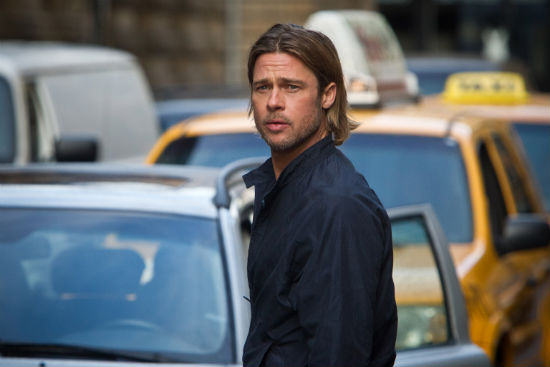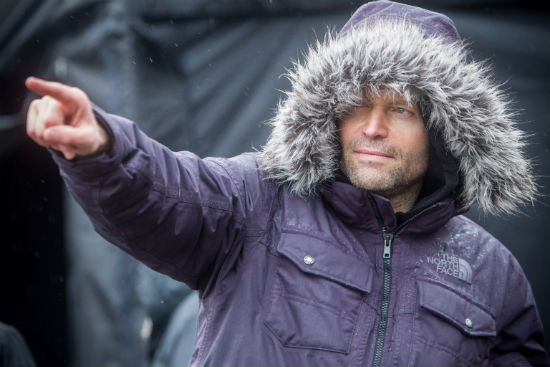'World War Z:' Footage Description, Video Blog And Marc Forster Talks New Ending And Zombie Conventions
"I wanted to make a film my sons could actually see before they get old," said Brad Pitt, talking about his upcoming zombie film, World War Z. "As you will see, we got a little carried away." Pitt was on the Paramount lot last week, along with director Marc Forster, to introduce 20 minutes of footage from the June 21 release.
The actor, who is also a producer, spoke about what they were trying to do with the movie. "In Max Brooks' book we found much more than a zombie film. We found this global apocalypse," Pitt said. "This zombie epidemic as worldwide pandemic." That massive scope was certainly on display in the footage, which featured Pitt's character separating from his family to travel the world, hoping to figure out the source of the rising zombie apocalypse. Oh, and also rising walls of vicious zombies.
After the footage, Forster took questions from a handful of journalists, many of which were aimed at the film's controversial production. The process saw massive reshoots and rewrites. He admitted that, yes, the ending had been changed but that they were very happy with the result.
After the jump, read more about the footage itself, watch a video blog reacting to the footage, and read more from Forster about the ending, how the film goes against zombie conventions and more.
Here's a spoiler free video blog reacting to the footage, which was about 2o minutes long. Thanks to Ben Pearson from First Showing for joining me.
Skip down below to read more details of the footage and the quotes from Forster.
"How do we reinvent the zombies? How do we originate our zombies in a fields that's been done and done really well?" That was the question Pitt asked before the footage started, which ran about 20 minutes and acted as a truncated retelling of the movies first half. We start on the streets of Philadelphia and see much of what you see in the trailers. Pitt and his family in the car, things begin to go awry and they have to escape. Watching that scene – which happens very early in the film – in full, the most interesting thing was exactly what Pitt said, the reimagining of the zombies themselves. Right off the bat you seen these are not your typical zombies. They're not even typical running zombies. These are forces of nature. NFL linebackers just sprinting and leaping from kill to kill. And once they get someone, it takes only 12 seconds for a full transformation to take place. (This set video is from that.)
From there we're on an aircraft carrier where the military is trying to figure out how to combat this. This is proving difficult as news keeps pouring in of cities and coasts completely over run. Pitt, a former UN worker skilled handling global pandemics, is given an ultimatum. Either help us out, or you and your family have to go back to the main land. He of course helps.

Now we're in Israel and, oddly enough, everything seems okay. That's because the country (or just one city? it wasn't quite clear) got a early warning and built a wall to keep the zombies out. That's the wall from the trailer with the hundreds of zombies climbing up each other so, you can imagine what happens after that. Pitt is escorted around by a female officer, who has a bit of an issue, and a series of action beats lead them onto a commercial airliner. The one we see at the end of the newest trailer.
Like I said in the above video blog, the footage didn't do anything to really blow me away. It looks good, the potential was there, but nothing in it said this was going to be a movie that stood alongside some of the great zombie movies of the past.
Director Marc Forster, knows this. Maybe not my reaction to the footage but that World War Z was entering a classic genre with a lot to live up to. He stressed that, unlike most zombie films, this one portrays a "global epidemic" and also presented a new metaphor for the ravenous antagonists. "The idea we had for the zombies came out of nature, this flocking and swarming," Forster said. "All the George Romero films of the '70s where the zombies were such a great metaphor for consumerism, for me the metaphor is more about overpopulation today and less and less resources."

Where the film shows a world with less and less resources, Paramount actually gave the director more and more for his film. Here's what he said when asked about the controversy of reshooting the ending:
We shot the movie and put it together and we all felt the ending wasn't what we wanted it to be and could be better. We showed it to the studio, the filmmakers agreed and made a proposal and we went back and did some additional shooting. We are really happy now with the result....It's a different ending, and I prefer it. I think it's more powerful and works in the favor of the story.
He later added that reshooting the ending, besides making the movie better, was the best thing imaginable for him:
It was really refreshing and a great thing that we actually redid the ending because I never did that with any of my other movies. But I realized a lot of great directors I admire, from Bergman to Felini, they always were shooting, going to the editing room, shooting again. This process back and forth. And that was a really great thing that we were able to do that and the studio allowed us to do that because it made the movie better and that gave us a different reflection of it. When you're really in it and doing it, sometimes, it gets overwhelming. You might, for a moment, have to take a step back and see how it feels all together.
We won't know how World War Z looks when it's all together until June 21 when it hits theaters. But from what we saw and heard, the potential is there. I'd just remain a little bit skeptical.
